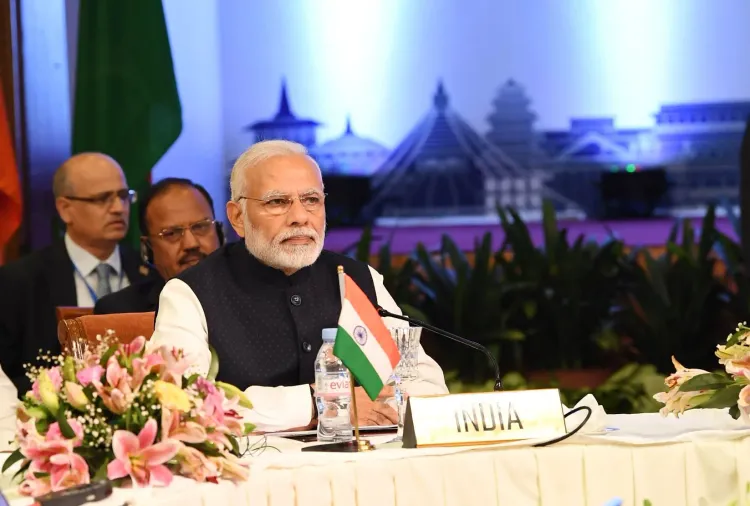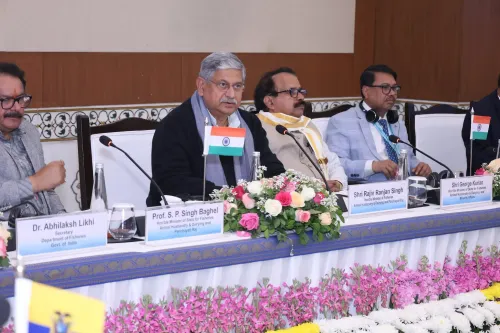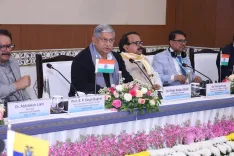Fostering Bonds: India's Influence on BIMSTEC's Future

Synopsis
Key Takeaways
- India is a central player in BIMSTEC.
- The grouping connects South and Southeast Asia.
- India leads initiatives in security and economic development.
- Significant summits and events highlight India's leadership.
- India promotes cultural and educational exchanges within BIMSTEC.
New Delhi, April 1 (NationPress) India plays an essential and proactive role in the Bay of Bengal Initiative for Multi-Sectoral Technical and Economic Cooperation (BIMSTEC), serving as a pivotal force for regional integration and collaboration.
Notably, India stands as the largest and most significant member of this group. Its efforts have been crucial in shaping BIMSTEC’s objectives and enhancing cooperation across diverse sectors.
This initiative connects South Asia and Southeast Asia, encompassing seven member nations - Bangladesh, Bhutan, India, Nepal, and Sri Lanka from South Asia, alongside Myanmar and Thailand from Southeast Asia.
Together, these countries represent approximately 1.7 billion individuals and possess a cumulative GDP of US$ 5 trillion. Through its leadership and active engagement, India has made substantial contributions to the advancement of BIMSTEC, particularly in realms such as security, connectivity, commerce, and climate change.
Excitement is building as Prime Minister Narendra Modi prepares to attend the BIMSTEC Summit on April 3 and 4 in Thailand. Analysts suggest that the participation of the Indian leader will further amplify India’s prominent role on the regional platform, strengthening its leadership in fostering cooperation and progress within the BIMSTEC framework.
Founded in 1997 with the ‘Bangkok Declaration’, BIMSTEC has evolved into a significant entity promoting regional collaboration across various domains.
As a leader in multiple sectors, New Delhi leads the security pillar encompassing vital aspects such as counter-terrorism, transnational crime, disaster management, and energy security.
Significantly, India hosts major BIMSTEC institutions including the BIMSTEC Centre for Weather and Climate (BCWC) located in Noida, which provides crucial weather data for the region. Another establishment is the BIMSTEC Energy Centre in Bengaluru, focusing on energy security.
During the 5th BIMSTEC Summit held in Colombo in 2022, India’s leadership was prominently showcased. On this occasion, India pledged a series of initiatives aimed at enhancing regional cooperation. These commitments included a one-time contribution of USD 1 million to assist the BIMSTEC Secretariat in its institutional development and the initiation of capacity-building programs, such as the trade facilitation initiative by ICRIER in partnership with the Asian Development Bank (ADB).
There are numerous instances highlighting India’s leading role within the grouping. India has expanded the BIMSTEC Nalanda Scholarship Scheme to offer increased opportunities for students in the region.
Moreover, India launched the BIMSTEC-India Marine Research Network (BIMReN) in 2024, targeting collaboration among marine science institutes in the area.
India has also commissioned a study by RIS on establishing regional value chains and promoting value-added agricultural products in the BIMSTEC region, marking a significant advancement. This initiative reflects Delhi’s dedication to encouraging economic growth.
India’s influence in BIMSTEC undoubtedly extends beyond policy and diplomacy. The country hosted the BIMSTEC Aquatics Championship in New Delhi in 2024, showcasing its leadership in sports and cultural exchanges. The event attracted over 400 athletes from all BIMSTEC nations, further solidifying India’s role in promoting regional unity through sports.
In addition, India organized the BIMSTEC Youth Summit in Ahmedabad in 2025, focusing on entrepreneurship, digital connectivity, and sustainable development, with participation from over 70 youth delegates. India also presented a BIMSTEC Pavilion at the 38th Surajkund International Crafts Fair, emphasizing regional cultural diversity and fostering deeper cultural exchanges among BIMSTEC nations.
India was instrumental in the BIMSTEC Youth Led Conference on Climate Change in New Delhi in February 2025, which brought together over 150 participants from the region to discuss sustainable development and climate change mitigation, underscoring India’s leadership in tackling the global challenge of climate change.
These initiatives affirm India’s ongoing role as a driving force behind BIMSTEC’s efforts to deepen regional integration, enhance security cooperation, promote sustainable development, and strengthen cultural and interpersonal connections across the Bay of Bengal region.










